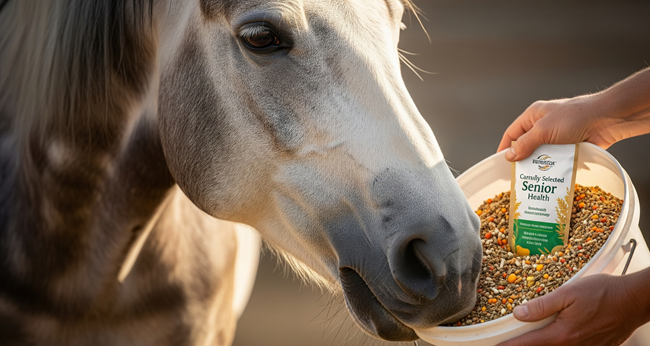
Horse feeds formulated specifically for older horses are a good option for your horse. Most commercial horse feed companies have a senior feed product. These products are high in fiber with added fat for energy. In addition, protein and certain vitamins and minerals are slightly elevated to aid in the absorption of these nutrients. Because of the high fiber content, a senior feed can be fed as a complete feed to a horse. A complete feed can be fed alone to meet an animal’s nutritional requirements. An equine complete feed will be high in fiber and can be fed without an additional forage source. Senior feeds are usually in a pelleted form and can be wet down and made into a soft, moist mash. This should be easier for your horse to eat. You should still offer a good-quality, soft hay to give your horse something to do and avoid boredom.
A typical diet for an older horse might include a good-quality hay, a senior-formulated feed (fed in small amounts several times a day), and of course, free access to clean, fresh water and trace mineral salt. In the winter, make sure the water is a comfortable temperature for drinking as extremely cold water will hurt the horse’s worn-down teeth. Watch an older horse for choking as well. An older horse’s body condition score should be monitored to prevent the horse from getting either too fat or too thin. A senior horse’s diet should include increased protein, added fat, an easy-to-digest fiber source, and adequate vitamin and mineral supplementation.
The energy needs of a senior horse can be determined by its workload and ability to maintain body condition. An older horse often experiences a decline in the ability to digest fiber, which is likely related to dental health and impaired fiber digestion in the large intestine. Consequently, an older horse should receive good-quality hay that is free of difficult-to-digest weeds. If an older horse is sensitive to high starch diets, it may be important to supply adequate energy in a low starch diet. Added dietary fat will help increase the caloric intake of the diet without increasing the starch intake. Digestibility may be improved by processing the grain.
Several feed companies offer extruded grain products formulated specifically for an older horse. These products may prove beneficial to increase the horse’s feed utilization. If a horse cannot chew hay sufficiently, then a complete feed that is high in fiber can be given. Many feeds specially formulated for senior horses are high in fiber and fat and can be fed as a mash, to give the horse all that is nutritionally required.
Protein
Research suggests that an older horse has a lower ability to digest protein (Ralston et al., 1989). Therefore, it may be advantageous to feed a high-quality protein source to ensure there is adequate lysine and threonine in the diet. However, protein should not be overfed.
Minerals
Research suggests a diet with a slight increase in phosphorous (0.3 to 0.4% increase), relative to maintenance levels, can be fed, given the decrease in an older horse’s ability to digest phosphorous.
Vitamins
If a horse is fed a commercially available grain mix, it should receive adequate vitamins in the diet. A horse on good quality pasture will usually have good access to vitamins.
Provided by Extension.org.
Related Articles & Free Email Newsletter Sign Up
Horse Deworming Practices & Guidelines
How to Stop a Horse from Jigging


Comment here